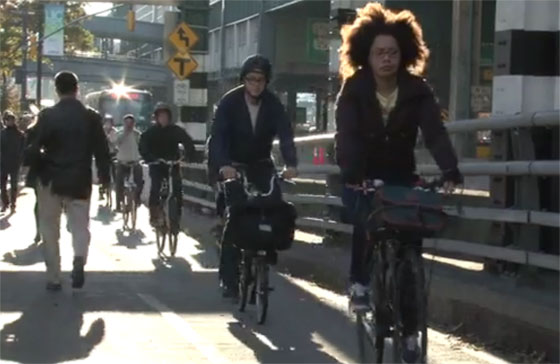Earth Day just happened. Spring is in the air, flowers are blooming, and so are politicians who call for renewable power. Support for renewable energy has become a constant in U.S. politics and is only getting stronger. We ignore, however, one abundant form of renewable energy -- a human being on a bicycle.
Bicycling needs neither technological breakthroughs nor government subsidies. Even better, it’s a substitute for oil (whereas wind and solar displace natural gas and coal). What’s more, this form of renewable energy directly addresses other ills, from chronic disease to urban air pollution.
Why should a human being on a bicycle be considered renewable energy? Simple. We can’t be depleted. We require no combustion of fuel to pedal. And we emit no pollutants (okay, maybe a little bit of methane while bicycling). And, like wind and solar, we are a home-grown form of energy.
To fuel the bike, the cyclist must eat a bit more food to obtain energy to push the pedals. But that food is a form of renewable energy -- it ultimately comes from the sun. And thanks to the bicycle’s marvelous efficiency at converting mechanical power to forward motion, the required energy input is minimal.
According to the Encyclopedia of Energy, bicycles can cover a given distance using one-thousandth of the fuel that an automobile uses. If we were to rely on crop-based fuels for automobiles, there would be a concern about using up all our farmland to provide fuel for transportation. Not so with using food to fuel humans riding bicycles.
It’s with reduction in oil use that bicycling really trumps the other renewable resources. Wind and solar displace electricity, which in the U.S. is generated almost entirely with coal and natural gas to the extent fossil fuels are used. Accordingly, windmills and solar panels displace very little petroleum. It’s our transportation sector that is oil-based, which means that bicycling principally displaces oil.
Even in cities like New York, where the electrically powered subway is the mainstay of mobility, bicycling displaces some car or taxi trips. And in most of the 50 states, miles ridden on bikes translate directly into less gasoline burned and less oil imported.
Even better, unlike wind and solar, bicycling doesn't demand large public subsidies to thrive. All bicycling requires is a modicum of protected space on the road and the legal right to be there. New York City has been one of the cities leading the way here, showing that increasing the space reserved for cyclists on the roads can lead to significant increases in bicycling -- the number of daily cyclists has been increasing and there are now 750,000 people who bicycle at least occasionally in the City. While the controversy associated with these measures has not ended, they might be viewed differently if we viewed them as the promotion of renewable energy.
We provide sidewalks for walking (another, albeit less efficient form of renewable energy) and we all agree that our city needs a great public transit system. If we want to truly encourage renewable energy, why isn’t there a connected protected bike lane network that will enable all of us, even a child, to go where their hearts leads them by bicycle in the city?
So, let’s change the discussion on renewable energy. When we support renewable energy like wind and solar we should not forget to add the one staring us in the face when we look in the mirror -- us, especially on a bicycle. From now on, when you support renewable energy, make sure to include bicycling and, if you’re not a person who bicycles, maybe you will understand better why public promotion makes sense.






